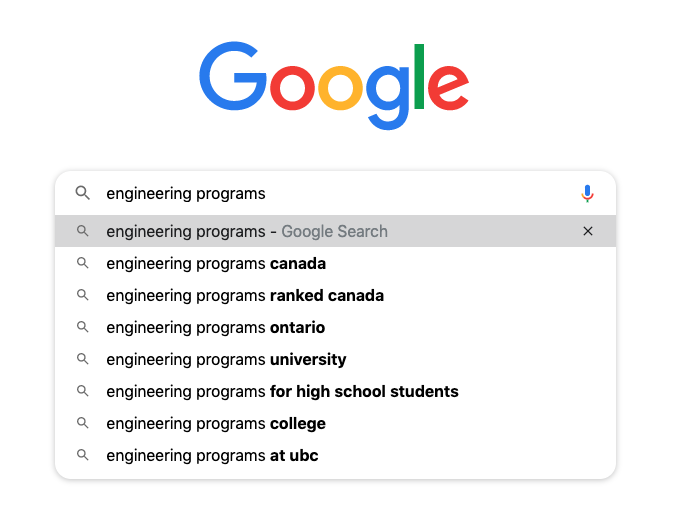Search engine optimization (SEO)
The purpose of SEO is to increase the volume of visitors your website receives from people using search engines like Google, Bing and Memorial’s own search bar.
Most people use a search engine to find what they're looking for on the internet, but a search engine cannot include your web page in its recommendations unless it knows what your web page is about. The purpose of SEO is to tell search engines exactly what your web page is about.
Improving the SEO of a web page is a 3-step process:
- Create a list of keywords for your page
- Insert these keywords into the five SEO hotspots on your page
- Make additional changes to your page's content to improve SEO
Step 1:
Create a list of keywords for your page
The first step to improving your page's SEO is to come up with a list of "keywords" for your page.
A keyword is not necessarily a single word; it is either a word or a short phrase that describes the content someone will find on your page. For example: Graduate programs is a good keyword for a page about graduate programs.
When trying to decide what keywords describe your page, ask yourself: what would a person Google to find my page? Everyone you think of is a potential keyword.
Keep in mind that no keywords should be long, but keywords that are 2-5 words long tend to perform better than single words. This is because they are more specific. Example:
Programs is a poor keyword because it is vague: no one would google "programs." Engineering graduate programs is a good keyword because it is specific. People are specific when they Google something.
Many people use Google’s auto-suggest function to see common searches. By simply typing in Engineering programs, you will see what people commonly search for:

Based on those popular searches, we know "Engineering programs Canada" might be a good keyword for our page.
There are also free tools such as keywordtool.iu, where you type in a keyword such as engineering program and it will list additional keywords you may not have thought of, based on actual search engine queries.
Step2:
Improve you page's SEO with keywords
Once you have compiled a list of keywords for your page, you should begin optimizing your page for these keywords.
Optimizing your page for your keywords is simple: you plug your keywords into these slots on your web page:
- Use keywords in your page's URL (this means section title in T4)
- Use keywords in your page title
- Use keywords in your heading tags (H1-H6)
- Use keywords in your page's hyperlinks
- Fill in your metadata fields
The reason it is good to come up with a list of 4 or 5 keywords, is so you can use different keywords in different keyword SEO slots on your page.
If your URL is:
mun.ca/engineering/graduate-programs
Make your page title a variation on this that uses a slightly different keyword:
Graduate degrees in engineering
Now you have used two keywords: graduate programs and graduate degrees. So whether someone has Googled graduate programs or graduate degrees, they're likely to find your page.
A variety of keywords is good, but do not use so many keywords that you dilute and detract your primary keyword.
Three more ways to improve your SEO
The examples above use keywords to improve your SEO. There are other actions you can take to further improve your SEO rankings as well.